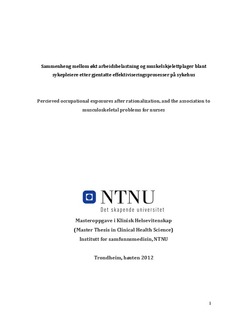Sammenheng mellom økt arbeidsbelastning og muskelskjelettplager blant sykepleiere etter gjentatte effektiviseringsprosesser på sykehus
Master thesis
Permanent lenke
http://hdl.handle.net/11250/264545Utgivelsesdato
2012Metadata
Vis full innførselSamlinger
Sammendrag
Background: Studies have shown that rationalization has an impact on workload, work demands as well as a negative effect on workers’ health. Rationalization in the health sector may have impacts on musculoskeletal and mental disorders, both which are the dominant complaints of European workers.
Purpose: The aim of this study is to identify possible health effects on nurses after rationalization in a Norwegian Hospital. Based on former studies, the hypothesis is that rationalizations will lead to increased workload and strain to nurses. In this study it is postulated that work demands of physical, mental, emotional and social character is potential factors to influence nurses’ musculoskeletal health.
Material and Methods: Included in this study were 76 nurses and 5 leaders, all from a clinic who has gone through several rationalizations. This study combines survey data of nurses’ self-reported strain and musculoskeletal pain, and interviews with both nurses and leaders.
Results: The results indicate that nurses had increased work-load and experienced strain after rationalizations in hospitals. The work demands of physical and mental character have a significant influence on self-reported shoulder-neck and low back pain. Furthermore, it is implicated that level of information, participation and the psychosocial work-environment will affect these outcomes
Conclusion: This study confirm that rationalization in hospital leads to higher job demands, which has an impact on nurses musculoskeletal and psychosocial health. Through interviews with the nurses practical suggestions for improvement of the process is suggested.
